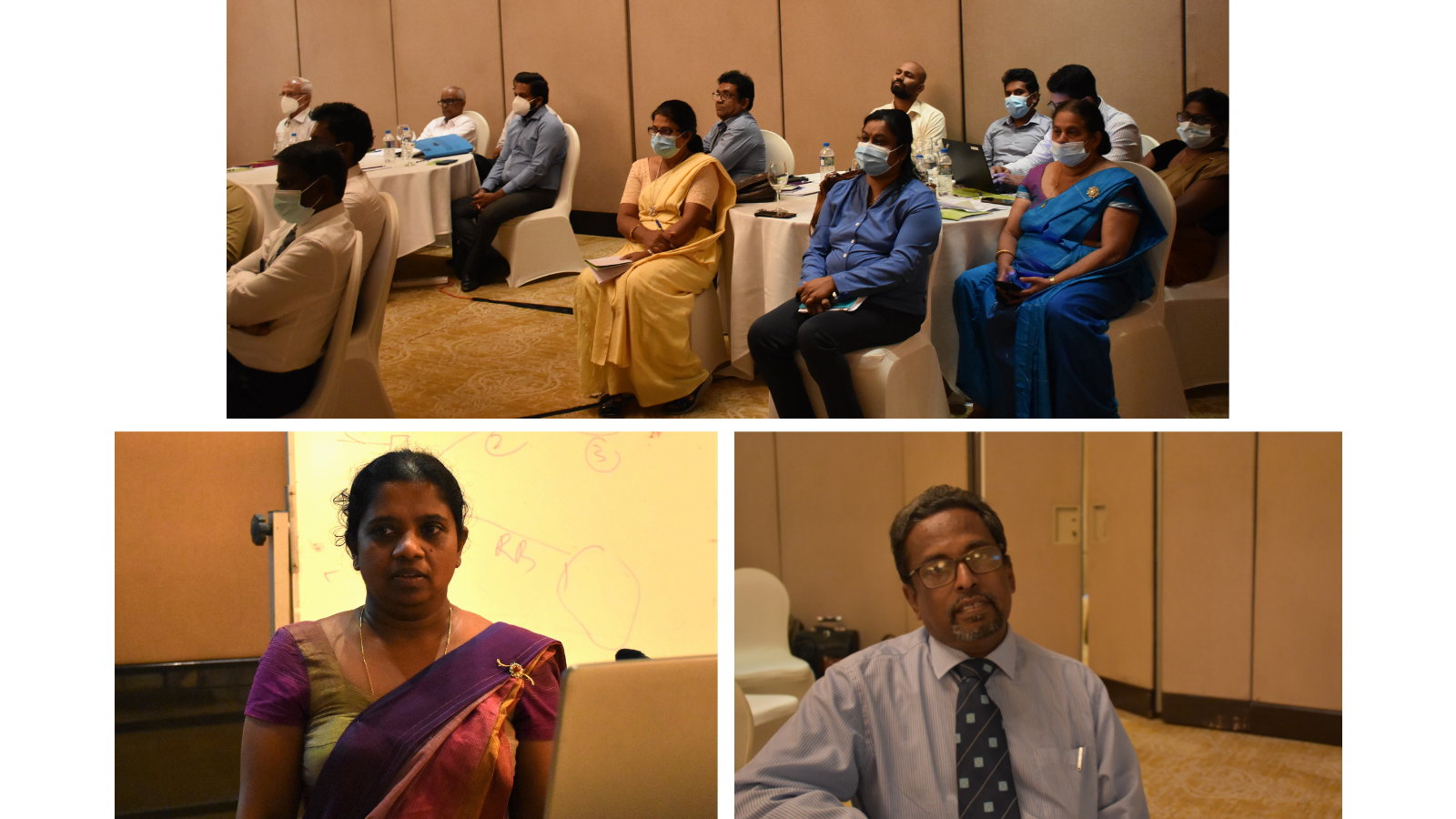Strengthening Irrigation sector in Sri Lanka to ensure appropriate disaster-resilient measures
Building Disaster-Resilient Infrastructure through Enhanced Knowledge
September 16, 2022

(L-R): Participants at the first training on Post Disaster Needs Assessment and Disaster Recovery Planning; Ms. Anoja Seneviratne, Director, Mitigation Research & Development, DMC; Eng. V. Premakumar, Provincial Director Irrigation, Northern Province
Colombo, Sri Lanka, 16 September 2022: Recognizing the necessity for greater investment in the planning process for disaster-resilient infrastructure across Asia and the Pacific, UNDP through its Regional Hub in Bangkok with the financial support of the Asian Development Bank (ADB) has launched the Project, ‘Resilient Infrastructure through Enhanced Knowledge’. The Project will build the capacity of selected infrastructure sectors in four countries; namely Sri Lanka, Armenia, Cambodia and Fiji; to ensure that appropriate disaster-resilient measures are defined and applied into pre-disaster preparation for recovery and post-disaster recovery efforts.
Considering the importance of water and food security, Sri Lanka has selected the Irrigation sector to develop a comprehensive country-specific disaster recovery framework under this project. The activities will concentrate on supporting Post-Disaster Needs Assessment (PDNA) training to Government officials, utilizing contingency and recovery tools and plans, improve financial preparedness planning which will help to meet the resources required for disaster recovery and cover the additional costs of building forward better.
The Project is implemented in collaboration with the Disaster Management Center (DMC), the Department of National Planning, Department of National Budget and all stakeholder agencies in the Irrigation sector; including the Department of Irrigation, Department of Agrarian Development, 9 Provincial Departments of Irrigation and the Mahaweli Authority of Sri Lanka.
The first training on Post Disaster Needs Assessment and Disaster Recovery Planning took place in Colombo recently, with over 63 participants from across the above stakeholders including Engineers, Planners, and Accountants. Speaking on the importance of such trainings, Ms. Anoja Seneviratne, Director, Mitigation Research & Development, Disaster Management Centre stated, “the Irrigation sector is one of the most important sectors in the country. Irrigation resilience is not only for water management, but also provides inputs for agricultural expansion, facilitates technological change and helps increase sectoral productivity and the GDP of the country…Introducing a disaster recovery framework will benefit the sector as it ensures recovery to build back faster and better. This workshop will be the first of such to brainstorm, share knowledge in damage & loss, and recovery in the sector following a more scientific way.” She went onto note, “This initial step will be foundational towards the country’s disaster resilience. I appreciate all the stakeholders for their engagement and appreciate UNDP and ADB’s support for a cleaner, greener and resilient Sri Lanka.”
In 2016 and 2017, UNDP in Sri Lanka coordinated the PDNAs on behalf of the UN system, and supported the Government of Sri Lanka, together with the European Union and the World Bank, to conduct a comprehensive assessment of Post Disaster Needs after the 2016 and 2017 flood and landslide disasters. The total estimated cost of damages and losses for irrigation infrastructure was LKR 2708 Million.
One of the major challenges identified in this assessment was the lack of baseline data and insufficient capacities to conduct PDNAs, and the need to establish an institutional framework for recovery.
This project will build the capacity of Sri Lankan Government officials and relevant stakeholders in the irrigation sector institutions and related partner agencies for disaster recovery in the long run, by adapting the PDNA and Disaster Recovery Framework (DRF) methodology for the irrigation sector including sector templates, developing SOPs by bringing together all relevant stakeholders to create a pool of experts in the sector.
Eng. V. Premakumar, Provincial Director Irrigation, Northern Province as a participant of the workshop stated, “This is a great opportunity for us, particularly for the young engineers that work on the ground in the Northern Province. There are 24 engineers in the Province, and it is essential that we continuously enhance their capacities to ensure that the key infrastructure upon which the communities depend on are disaster resilient. This has provided us with the opportunity to engage with and learn from esteemed sectoral experts, as well, and will surely contribute to the growth of our engineers and their knowledge on disaster-resilience.”
Adding to this, Mr. M A F Mubarak, Deputy Director, National Budget Department noted, “As a part of the development of the Disaster Recovery Framework, we’re received technical support on financial preparedness planning and post disaster budget execution capabilities. Hence, this enables Sri Lanka to be ready to face any upcoming disaster events, which in turn will be helpful for the economy of the country.”
Speaking on UNDPs role of supporting disaster preparedness efforts, Mr. Vajira Hettige, Technical Coordinator- Climate and Environment Team, UNDP in Sri Lanka noted, “this pre-disaster recovery planning in the irrigation sector is a unique opportunity, since post disaster recovery planning is usually ad-hoc in nature. Involvement of national planning and budget departments from the inception will support financial preparedness and identify new sources of risk financing, which will ultimately contribute towards expediting resilient recovery in the irrigation sector.”

 Locations
Locations